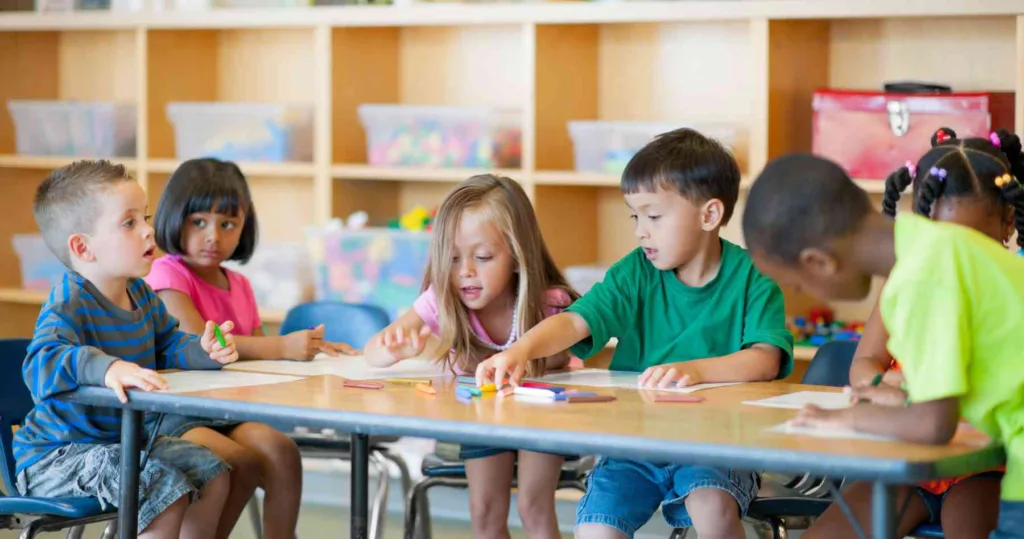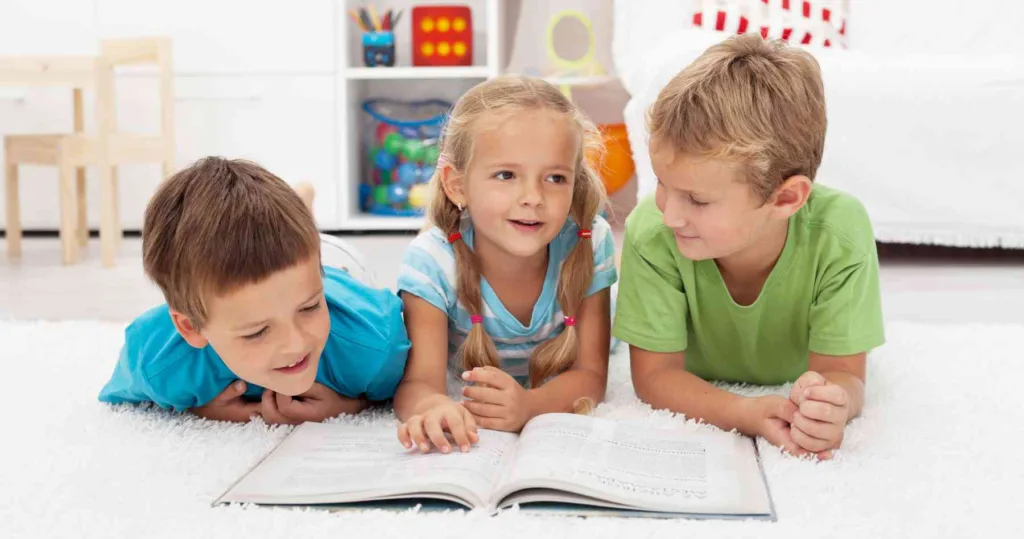Unlocking Your Child's Full Potential: The Crucial Importance of Preschool Education
Preschool education is an important step in a child’s early development. It offers young children an opportunity to learn and grow in a structured, supportive environment. Preschool can provide a foundation for later academic success, as well as social and emotional well-being. In this article, we will explore the benefits of preschool education for young children, such as socialization, cognitive development, and school readiness. We will also provide parents with tips on how to choose the best preschool program for their child’s needs.

Socialization
One of the primary benefits of preschool education is socialization. Preschool provides children with the opportunity to interact with peers and develop important social skills. Young children learn how to share, take turns, and cooperate with others in a supportive and nurturing environment. They also learn how to express themselves verbally and develop important communication skills. These social skills are critical for later academic success and future social interactions.
Cognitive Development
Preschool education can also support cognitive development. During the early years, a child’s brain is rapidly developing, and exposure to new experiences can help promote learning and development. In preschool, children are exposed to a variety of activities that can help support their cognitive growth, such as puzzles, books, and games. They also learn basic concepts such as counting, letters, and shapes, which can set the foundation for future academic success.
School Readiness
Another benefit of preschool education is school readiness. Children who attend preschool are more likely to be prepared for the transition to kindergarten and beyond. They have already learned important skills such as following directions, participating in group activities, and working independently. This foundation can help children succeed in school and beyon
Get In touch
Leave us a message
4 Claret Road, Table View, 7441
(021) 556 4146
office@applebeekids.com
Tips for Choosing the Best Preschool Program
Choosing the right preschool program for your child can be overwhelming. There are many factors to consider, such as location, cost, and curriculum. Here are some tips to help you make the best choice for your child:
Research different programs: Start by researching different preschool programs in your area. Look for programs that align with your family’s values and goals.
Schedule a visit: Once you have narrowed down your options, schedule a visit to each preschool. This will give you a chance to see the environment and meet the teachers.
Ask questions: During your visit, don’t be afraid to ask questions. Ask about the curriculum, teacher qualifications, and policies.
Consider your child’s needs: Consider your child’s personality and needs when choosing a preschool program. Look for a program that can support your child’s unique strengths and challenges.
Trust your instincts: Ultimately, trust your instincts when choosing a preschool program for your child. You know your child best, and you want to choose a program that will support their growth and development.
Preschool education can provide young children with a foundation for later academic success, as well as social and emotional well-being. By choosing the right preschool program, parents can help support their child’s growth and development during this critical stage of life. Remember to consider factors such as socialization, cognitive development, and school readiness when choosing a preschool program. By doing so, you can help set your child up for success in school and beyond.


ExcellentBased on 28 reviews Trustindex verifies that the original source of the review is Google.
Trustindex verifies that the original source of the review is Google. Pieter Kotze2022-03-11Great pre-primary school in Table View, it has been there for many years and we are now on the verge of sending the 2nd generation there and although they have been around for years, the staff are current and up to date with the latest in childcare and early childhood education, peace of mind for sure...Trustindex verifies that the original source of the review is Google.
Pieter Kotze2022-03-11Great pre-primary school in Table View, it has been there for many years and we are now on the verge of sending the 2nd generation there and although they have been around for years, the staff are current and up to date with the latest in childcare and early childhood education, peace of mind for sure...Trustindex verifies that the original source of the review is Google. Gareth Bolt2021-08-20Jackie,Maude and Applebee team look after our little boy so wonderfully!Trustindex verifies that the original source of the review is Google.
Gareth Bolt2021-08-20Jackie,Maude and Applebee team look after our little boy so wonderfully!Trustindex verifies that the original source of the review is Google. Shakurah Hackley2021-08-20My son loves his teachers. They care for our kids and go the extra mile.Trustindex verifies that the original source of the review is Google.
Shakurah Hackley2021-08-20My son loves his teachers. They care for our kids and go the extra mile.Trustindex verifies that the original source of the review is Google. Nolu Mandindi2021-08-19My daughter been a student since 2019, her brother joined her in 2021, we couldn't be happier with the professionalism shown by the staff. The constant feedback from teachers on progress is on point.
Nolu Mandindi2021-08-19My daughter been a student since 2019, her brother joined her in 2021, we couldn't be happier with the professionalism shown by the staff. The constant feedback from teachers on progress is on point.
The Importance of Playtime for Children’s Social Development
By playing and learning together, children develop important social skills that will serve them well throughout their lives. Playtime provides children with the opportunity to practice important social behaviors, such as sharing, taking turns, and cooperation. These skills are essential for building positive relationships with others and navigating social situations.
Playing with others also helps children develop their language skills. During play, children engage in conversations with their peers, helping them build their vocabulary and develop their communication skills. Children learn how to express themselves, listen to others, and ask questions. These skills are crucial for success in school and beyond.
In addition to social and language skills, playtime also helps children develop self-control. During play, children learn to regulate their emotions and behavior, such as taking turns, waiting patiently, and following rules. These skills are important for academic success and personal growth.
However, conflicts may arise during playtime, and it is important for children to learn how to resolve them in a positive way. With support from teachers, children can learn to resolve conflicts and negotiate with their peers. They learn to communicate their needs and work collaboratively with others to find a solution. These conflict resolution skills are essential for building positive relationships with others and navigating social situations.
Emotional development is also an important aspect of playtime. Children learn to understand their own emotions and the emotions of others. By exploring a variety of emotions during play, children develop empathy, the ability to put themselves in someone else’s shoes. This skill helps children build positive relationships with others and navigate social situations in a thoughtful and compassionate way.
Playtime is a crucial part of a child’s development. By playing and learning together, children develop important social skills, language skills, and self-control. With support from teachers, children learn to resolve conflicts that may come up during play. Emotional development is also an important aspect of playtime, as children learn to understand their own emotions and the emotions of others. As parents and caregivers, it is important to encourage playtime and support children’s development through play.

Importance of a Good Preschool: How it Shapes Your Child’s Future Success
Choosing the right preschool for your child is one of the most important decisions you will make as a parent. Preschool provides a foundation for a child’s future education and personal growth. A good preschool will help prepare your child for success in elementary school and beyond.
A good preschool offers a safe and nurturing environment where children can learn and grow. The curriculum is designed to promote cognitive, social, emotional, and physical development. Teachers are trained to recognize the unique learning needs of each child and provide individualized instruction and support.
One of the most important benefits of a good preschool is school readiness. Children who attend preschool are more likely to be ready for the academic and social demands of elementary school. They have a head start on important skills such as counting, letter recognition, and following directions. They also have experience in a structured classroom setting, which helps them adjust more easily to elementary school.
In addition to school readiness, a good preschool offers opportunities for socialization and emotional development. Children learn how to interact with their peers, build positive relationships, and navigate social situations. They also learn how to regulate their emotions and develop empathy for others.
A good preschool also offers opportunities for physical development. Children have access to age-appropriate equipment and activities that help develop their gross motor skills, such as running, jumping, and climbing. They also have opportunities for fine motor development, such as coloring, cutting, and writing.
In conclusion, a good preschool is essential for a child’s development and future success. It offers a safe and nurturing environment where children can learn and grow. A good preschool helps children develop important skills such as school readiness, socialization, emotional regulation, and physical development. As parents, it is important to carefully consider your options and choose a preschool that meets the unique needs of your child.
